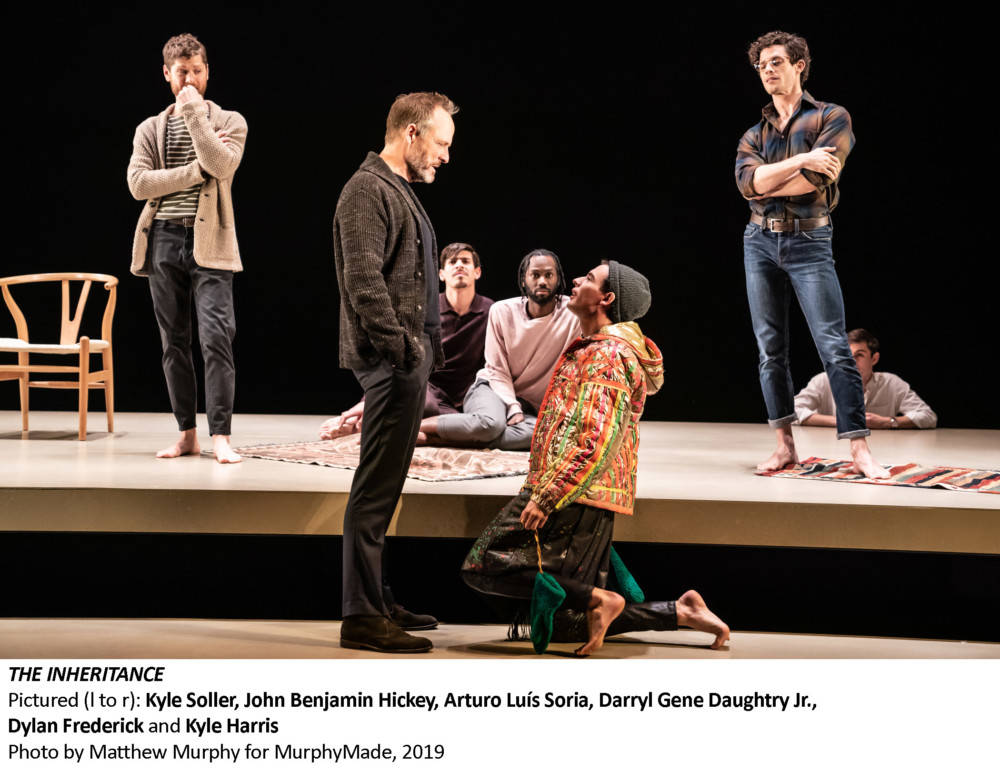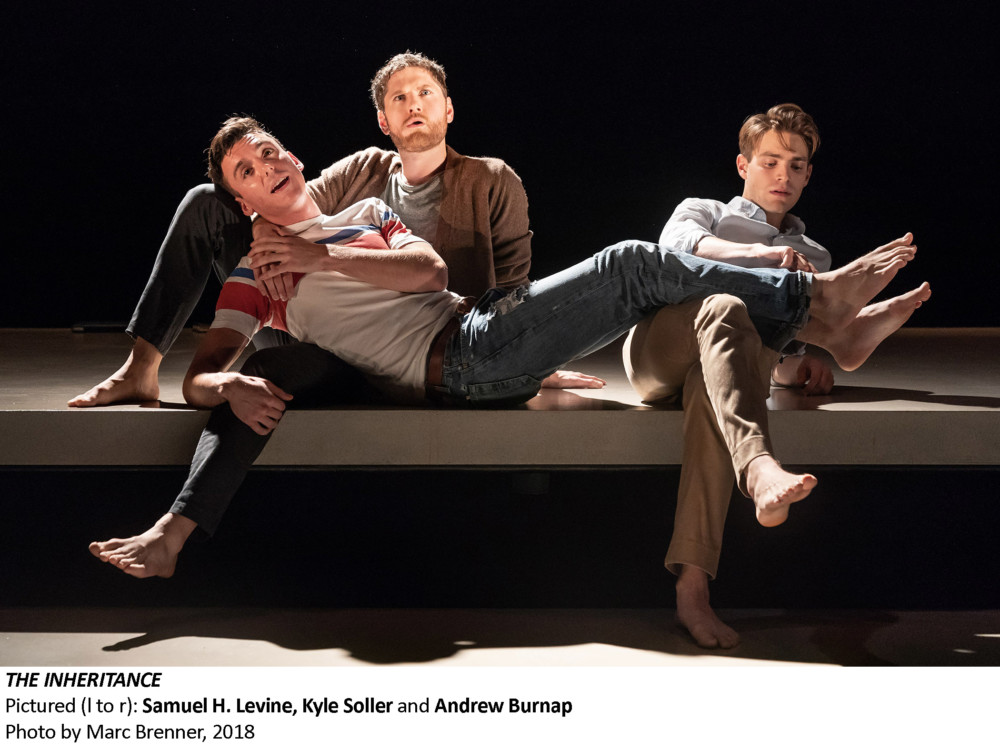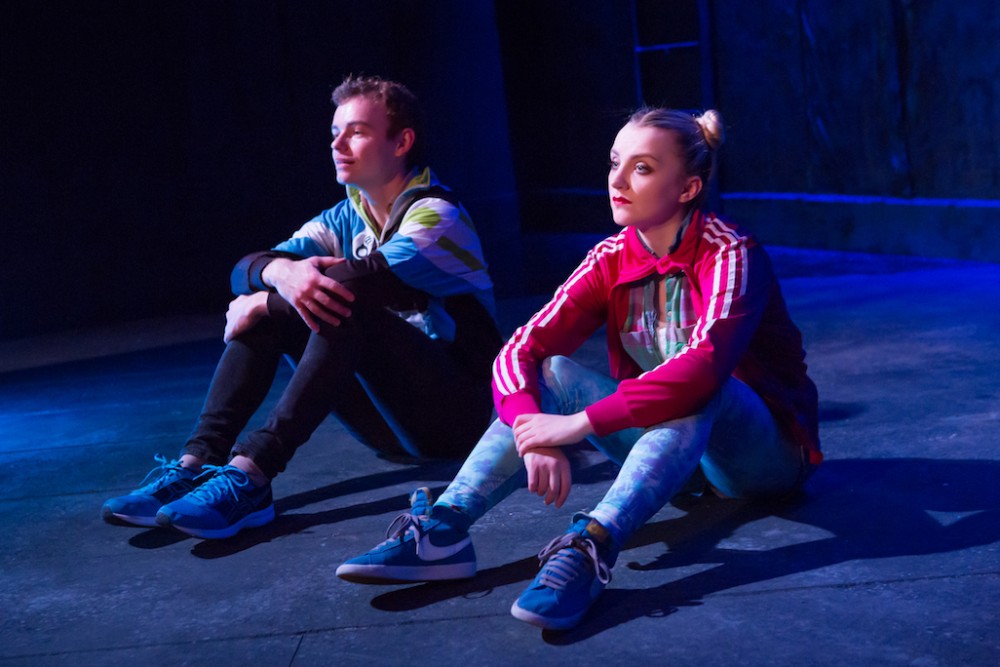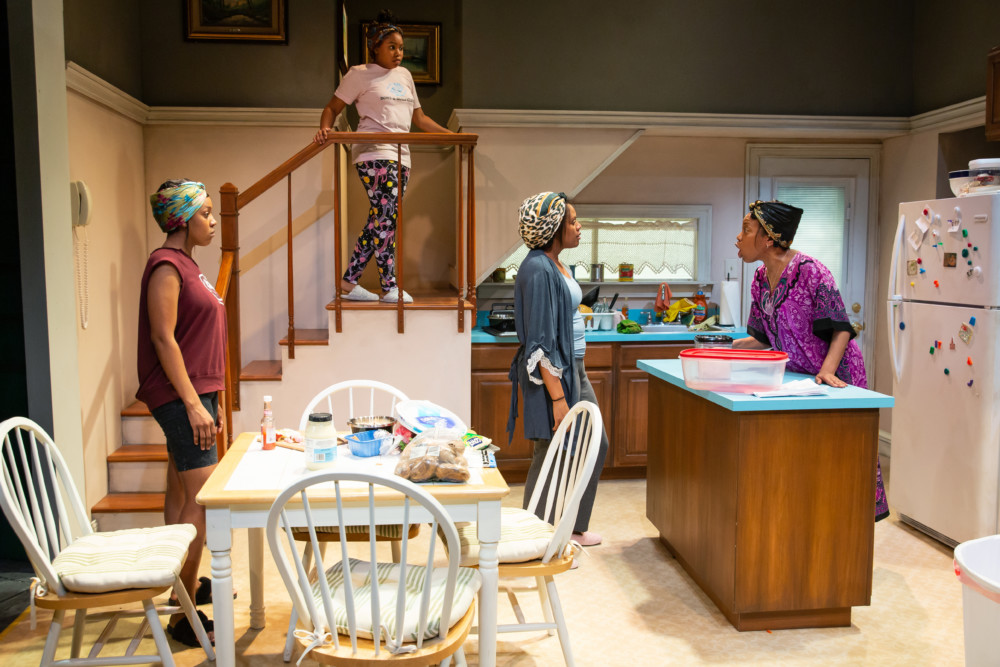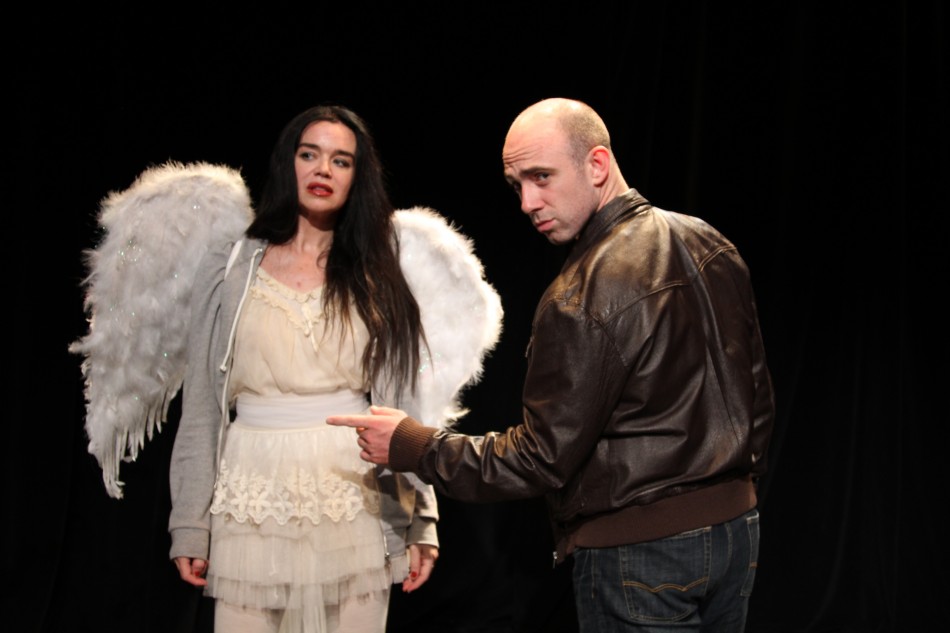By Samuel L. Leiter
American playwright Matthew Lopez’s (The Legend of Georgia McBride) marathon play, The Inheritance, directed by Stephen Daldry (Billy Elliott), comes to Broadway’s Ethel Barrymore Theatre after its multiple award-winning London run, produced by the Young Vic. It arrives with all the markers of what promise an epic theatregoing event, akin to that of Angels in America. Undeniably excellent as parts of it are, it fails to inherit the mantle of Tony Kushner’s epochal work.
The Inheritance is an episodic, literarily-inclined drama in two parts, each over three hours. I saw both the same day, the first at 1:00 p.m., the second at 7:00 p.m. One of its biggest lines occurs when a writer submits a 400-page playscript and is told, “You can’t ask an audience to sit through a play that long!” Lopez asked, though, and sit we did.
Set mainly between 2015-2018, it treats the subject of gay male friendship and love among youthful New Yorkers within the matrix of circumstances connected to the AIDS epidemic. It combines realism with hyper-theatricalism, and includes significant references to the current political landscape, in particular, the 2016 presidential election. It’s also melodramatically intense, angrily argumentative, unduly vulgar, egregiously overlong, and, while sprayed with strong laugh lines, emotionally overwrought.
Lopez’s premise is that the closeted British novelist, E.M. Forster, referred to here by his nickname, Morgan (British actor Paul Hilton), appears to young, gay writer Adam (Samuel H. Levine) as a paternalistic, philosophically warmhearted mentor to inspire his writing of a novel. That, as the action proceeds, turns out to be a transmutation of Forster’s 1910 novel Howards End into a tale of New York gay life, seeking, among other things, to define the responsibility to today’s homosexual community by its preceding generation.
This necessitates a complex style that ping pongs between direct address, describing things in the present tense, as they happen, (“He does this,” “He does that”), and conventional, in-the-moment dialogue. Added to this is a variety of chorus-like infusions from the sizable, nearly all-male cast, usually seen watching from the perimeter. The narrative’s principals sometimes even disagree with the choices being made for them as they’re introduced. (A similar method, albeit on a much smaller scale, is present in Adam Rapp’s The Sound Inside.)
The focal whirlwinds swirl around the love affair of social justice activist Eric Glass and young adult novelist Toby Darling. Eric (Kyle Soller, pushing the boundaries of quivering sensitivity), intellectually brilliant but financially limited, is soon to be evicted from his large, rent-controlled ($575 a month!), Upper West Side apartment. Toby (Andrew Burnap, too much the flaming drama queen), troubled victim of a tragic upbringing, is on the verge of bigtime success when a play he’s adapted from his best-known book is headed for Broadway.
After Eric and Toby’s love affair implodes, Eric befriends an ailing older man, Walter Poole (Hilton, again), 36-year companion of billionaire Henry Wilcox (John Benjamin Hickey). Walter dies and Eric becomes romantically involved with Henry, a well-informed Republican amid a sea of LBGT liberals. He’s also a widower, with two grown sons (Jonathan Burke and Kyle Harris).
Toby has a fling with Adam, who becomes the lead in his play before their relationship burns out. Loneliness personified, the newly successful Toby takes up with a destitute teenage prostitute, Leo, a ringer for Adam. (Levine plays both, but is far less credible as Leo.) Despite his initial ignorance, Leo falls—against his will, we’re informed—into Toby’s hedonistic lifestyle (cue the Fire Island orgies). He is, however, eventually Pygmalionized into an avid reader and writer before HIV-issues ensue.
Weaving throughout the web of plot developments is the image of a country house (the equivalent of the eponymous one in Howards End). Walter wanted Eric to inherit this healing place, in which Walter helped men dying of AIDS. Here, the idealistic Eric, who’s been drifting, finds his raison d’être, following an extended monologue by the sole female character, the house’s caretaker, Margaret (89-year-old Lois Smith, as great as she’s ever been). It concerns the gay son she dismissed but embraced again before he was lost to “the plague.”
The Inheritance is staged on costume and set designer Bob Crowley’s bare, white platform, placed mostly in a black void, its surface levels, riding on elevators and subtly changing the spatial configuration. Jon Clark’s potent lighting, Paul Englishby’s original music, and Paul Arditti and Christopher Reid’s sound design provide a suitably atmospheric environment.
Using a minimum of props, everything moves with swift vibrancy, including dance and mime. So insistently does Daldry depend on choreographic creativity, notably during moments of overt sexuality, that when a character stands before us completely naked it’s jarringly distracting.
Other disturbing devices include having everyone constantly refer to making love as fucking, allowing too many of the characters to use stereotypically gay mannerisms, and casting so many buff actors that it seems being gay automatically comes with a gym membership.
Despite the hosannas others have showered on the acting, it too often seemed to me exaggeratedly demonstrative, with characters constantly on the knife-edge of a breakdown. Hilton and Hickey mostly escape this trap, but their co-stars, while unquestionably skillful, do not. One furious flareup follows another, with diminishing results.
Much of The Inheritance’s nearly six and a half hours is taken up with biographical commentary about Forster (his posthumously published novel of homosexual love, Maurice, is constantly referenced), romantic entanglements and disentanglements, lengthy speeches, and discursive analyses of various topics. And Lopez, for all his talent, can’t help himself from overwriting. Is it really necessary, for example, to have an extended scene in which the future history of the main characters—a device also used recently in Jack Thorne’s Sunday—is laid out in detail?
Sometimes the play feels like a didactic potpourri of all the familiar gay play tropes and characters we’ve been seeing since The Boys in the Band. There’s even an academic-sounding convo about the meaning of “camp.” Since every character speaks with the smoothly articulate knowledge of a TV pundit, the information provided may be interesting but it’s not easy to believe in a world where no one ever is at a loss for linguistically colorful ways to express themselves.
The Inheritance, for many, will be an emotionally powerful, life-affirming work of art. For others, even those who acknowledge its flashes of intellectual and theatrical brilliance, it will be less than the sum of its parts. I stand with the latter but don’t necessarily disagree with the former.
Photos: Matthew Murphy
Ethel Barrymore Theatre
243 W. 47th St., NYC
Through March 1




